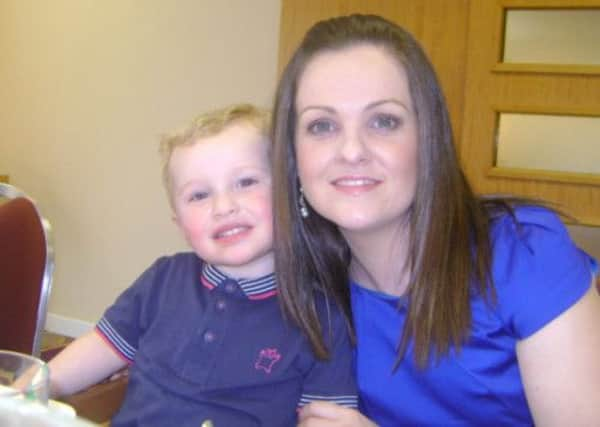Scottish cancer victims ‘abandoned’ after treatment


Macmillan Cancer Support says it wants to improve the help given to the 30,000 people a year diagnosed with cancer in Scotland.
The charity today announces a groundbreaking £5 million project to change the way patients are supported once their treatment is over.
Advertisement
Hide AdAdvertisement
Hide AdIt comes after predictions last week that half of Scots will be diagnosed with cancer within seven years.
The £5m funding being injected by Macmillan is the largest sum it has ever invested in a single project in Scotland.
The cash will be used to help redesign services to cope with patients who have finished their active treatment but still need support.
For example, it could involve setting up health and wellbeing clinics where patients can drop in for advice on concerns ranging from psychological issues to financial help.
Macmillan Cancer Support will work with the Scottish Government, the NHS and local authorities in developing initiatives to help patients.
The charity said it was vital to create a system that was responsive to the growing numbers of people living with cancer – currently 190,000 but expected to almost double by 2030.
Macmillan’s director in Scotland, Elspeth Atkinson, said: “Currently too many people can feel abandoned when treatment ends and don’t know where to go for support when they need it.
“This often results in them waiting until their routine hospital appointment – which may be months away – to ask for help or discuss their worries.”
Advertisement
Hide AdAdvertisement
Hide AdThe charity said in some cases hospital appointments were not really needed and people’s worries could be dealt with through other services.
Ms Atkinson added: “These appointments are in many cases medically unnecessary and are often not the best place for patients to get the support they vitally need.
“Our £5m investment is considerably more than Macmillan has ever invested in a single project in Scotland, which reflects just how important we think it is to put as much effort into supporting people to live with or beyond a cancer diagnosis as into treating the disease.”
Health secretary Alex Neil said: “More people are living longer with and after cancer, and we need to make sure that those people are prepared for, and supported to live with, the diagnosis and its treatment.”
Case study: I felt bad asking the NHS for help after my operation
ALAN Clarke said his experience of cancer had fundamentally changed his life as well as the lives of his family.
The former advertising executive, who now works in the music industry, was diagnosed with head and neck cancer in 2008.
The father-of-two from Newton Mearns underwent a 12-hour operation as well as chemotherapy and radiotherapy. While the treatment was essential to get rid of the cancer, the damage to his throat left him unable to eat or drink.
Advertisement
Hide AdAdvertisement
Hide AdHe has since had surgery to reconstruct his oesophagus and is now able to consume liquids. But he has not had solid foods for four years and continues to suffer other symptoms such as fatigue.
Mr Clarke said the NHS
had been “amazing” in treating his cancer and looking after him. “It is like this warm blanket that throws itself around you and guides you through the process,” he said.
After treatment, Mr Clarke said he continued to need support and help to carry on, but felt bad asking the NHS.
He has now been helped by Macmillan.
“I felt quite a lot of guilt when I was coming out the other side, when I wanted to go and interrupt people. I felt they were dealing with people who were really ill and the last thing they needed was me moaning about the ramifications of successful treatment.”
Case study: I expected to feel joy after treatment but it was the opposite
WHEN teacher Aislinn Gallanagh was diagnosed with breast cancer in 2010, she did not realise the impact it would have on her life even after treatment had finished.
With her son Odhran aged just 15 months at the time, she threw herself into treatment, with surgery to remove the cancer followed by radiotherapy.
But once this had finished, she was surprised not to feel jubilant as she struggled to cope with the aftermath of the disease. “The treatment I had was fantastic. They couldn’t have been quicker,” Mrs Gallanagh said.
Advertisement
Hide AdAdvertisement
Hide Ad“But when you’re done, you’re done. They say ‘This is your last day of radiotherapy and that’s you finished’ – but it isn’t you finished at all.
“During that time you’re going through treatment, you don’t get to think about anything. You are going from appointment to appointment and that is all you think about and don’t think beyond that.
“The only way for me to describe it was that it was like falling off a cliff. I had expected it to be a really joyous, memorable moment and it absolutely was the exact opposite.”
Mrs Gallanagh, 34, from Moodiesburn, said she had refused to think about what
had been happening to her or admit how unwell she had been. This affected her confidence so she did not feel able to ask for help and support, even though she had seen leaflets that were advertising support services.
But eventually her husband Sean encouraged her to seek help from Macmillan. She took part in a chi gung exercise class and is looking forward more positively.
“I would never have expected cancer to have such a huge effect on my confidence,” she said. “It meant that I had become ‘it’. I had nothing to talk about. It consumed me. It was all I had become.”